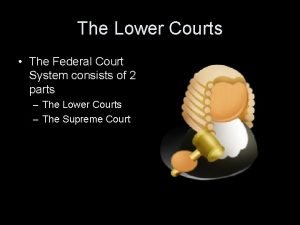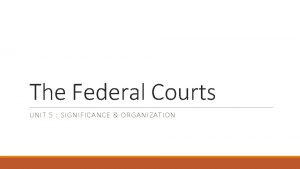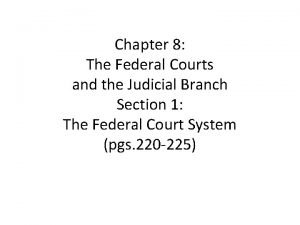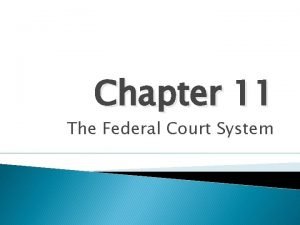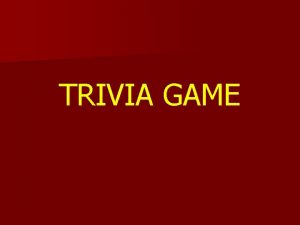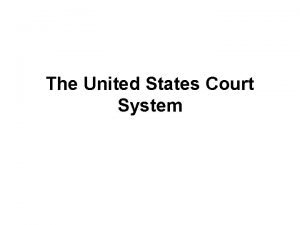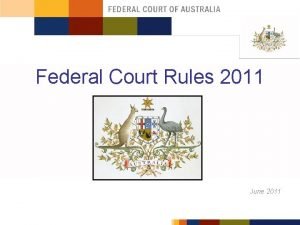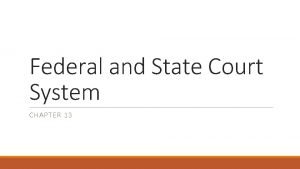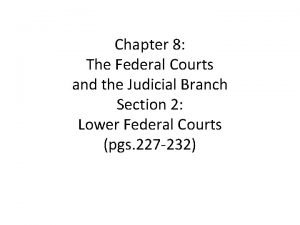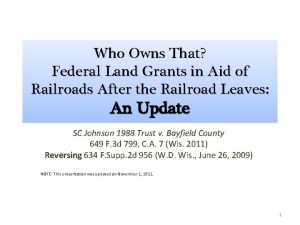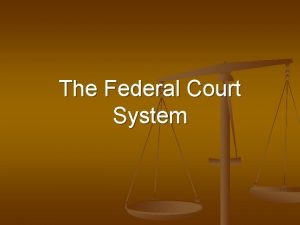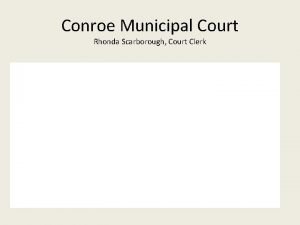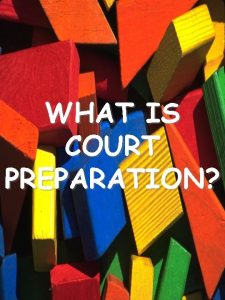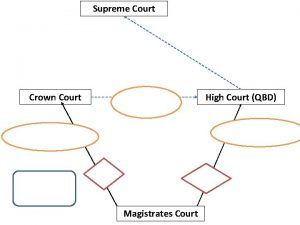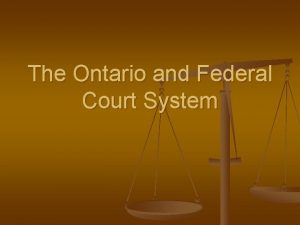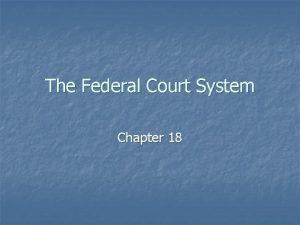The Federal Court System The American Legal System










- Slides: 10

The Federal Court System

The American Legal System • Dual system: state courts, federal courts • Jurisdiction: authority to hear certain cases • Both systems have 3 tiers: 1. trial courts – first time case is heard, evidence presented, verdict rendered (original jurisdiction) 2. appellate courts – appeal of verdict, no new evidence presented, review of case to make sure procedures were followed (appellate jurisdiction) 3. high or supreme courts - final decision on law


Federal Courts System Constitution created the Supreme Court, Congress used its authority to establish a network of lower federal courts. Examples of cases heard at the district courts: Federal crimes Civil suits between citizens of different states where the amount in question exceeds $75, 000 Interpretations of the Constitution Treaties with other nations Maritime law Review actions of some federal administrative agencies

Federal Courts: District Courts • Each state has at least one judicial district. o California has four district courts. • There are 94 federal district courts and nearly 700 judges.

Federal Courts: Court of Appeals • These are the "gatekeepers" to the Supreme Court. There are 13 court of appeals and 179 circuit judges. • Most of them are regional and hear appeals from district courts within their circuits. • Three judges on each panel.

Map 16. 1 - US District & Appellate Courts (p. 314) All courts referred to by their numbers except #12 & 13 which are DC Circuit and Federal Circuit.

Supreme Court (The Last Stop) • Original Jurisdiction (listed in Article III) - cases the S. C. can hear first are those involving: 1. other gov’t leaders 2. At least 2 states involved 3. Fed. Govt. is a party • Appellate - cases appealed to the S. C. 1. Constitution or national law in question

Supreme Court Jurisdiction - authority to hear a case Original Jurisdiction- ability to hear a case first Appellate Jurisdiction - cases appealed by lower federal courts or highest state courts Directions: Determine if the following cases would fall under the Supreme Court’s original or appellate jurisdiction. If the Supreme Court does not have jurisdiction in any of the following cases, write no jurisdiction. Explain your answers. 1. California sues Arizona over control of Colorado River. 2. Tookie Williams appealed his death sentence to the S. C. 3. The U. S. decided to hold the Mexican President against his will. He has asked for a court hearing. 4. John Smith sues John Doe over their backyard fence. 5. An act of Congress is being discussed by the 9 th Circuit of Appeals. 6. Texas is being sued by a citizen over a state law about driver license requirements.

Supreme Court Jurisdiction - KEY • California sues Arizona over control of Colorado River original, 2 states involved Tookie Williams appealed his death sentence to the S. C. • appellate, only if questioned as violation of Bill of Rights as cruel & unusual punishment The U. S. decided to hold the Mexican President against his will. He has asked for a court hearing. • original, involves leader from other country John Smith sues John Doe over their backyard fence • no jurisdiction, state civil suit, state courts handle An act of Congress is being discussed by the 9 th Circuit of Appeals • • appellate (possibly depends if ruling of 9 district is challenged) • Texas is being sued by a citizen over a state law about driver license th • requirements. no jurisdiction, state law, state courts handle
 Federal court system structure
Federal court system structure Us federal
Us federal Dual court system answer key pdf
Dual court system answer key pdf The federal court system chapter 11 answer key
The federal court system chapter 11 answer key Maryland court hierarchy
Maryland court hierarchy Is there a basketball court above the supreme court
Is there a basketball court above the supreme court Federal district court map
Federal district court map Federal court rules 2011
Federal court rules 2011 Chapter 13 federal and state court systems
Chapter 13 federal and state court systems Federal district court map new york
Federal district court map new york Federal court structure
Federal court structure
